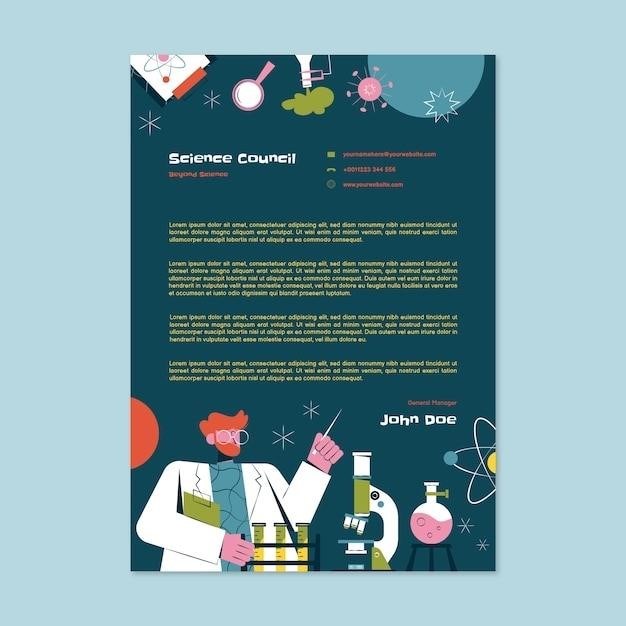ACS General Chemistry Study Guide⁚ A Comprehensive Overview
This comprehensive guide provides a structured approach to preparing for the American Chemical Society (ACS) General Chemistry Exam․ It covers a wide range of topics‚ including atomic structure‚ bonding‚ stoichiometry‚ thermodynamics‚ and more․ The guide is specifically designed to help students succeed on the ACS exam‚ which is a standardized assessment used to evaluate students’ understanding of general chemistry principles․ The guide is available in various formats‚ including PDF‚ and is an invaluable resource for students seeking to excel in their general chemistry studies․
Purpose and Scope of the Study Guide
The ACS General Chemistry Study Guide serves as an indispensable tool for students preparing for the ACS General Chemistry Exam‚ a standardized assessment that evaluates students’ understanding of general chemistry principles․ This comprehensive guide aims to provide students with a structured and in-depth review of key concepts‚ problem-solving strategies‚ and test-taking techniques․ The guide is designed to cover the full breadth of general chemistry topics‚ encompassing both first-term and second-term material‚ ensuring that students are well-equipped to tackle the challenges posed by the exam․ Its scope extends beyond mere content review‚ offering valuable insights into effective study strategies‚ practice problems with detailed solutions‚ and proven test-taking tactics to optimize exam performance․ The guide’s purpose is to empower students with the knowledge and skills necessary to excel in their general chemistry studies and achieve success on the ACS exam․

Key Features of the Study Guide
The ACS General Chemistry Study Guide stands out for its comprehensive approach and user-friendly design․ Key features include⁚
- Comprehensive Content Coverage⁚ The guide meticulously covers all major topics typically encountered in a full-year general chemistry curriculum‚ encompassing atomic structure‚ bonding‚ stoichiometry‚ thermodynamics‚ kinetics‚ equilibrium‚ and more․
- Structured Organization⁚ The guide presents information in a logical and sequential manner‚ facilitating comprehension and retention․ It is divided into sections covering first-term and second-term material‚ allowing students to focus on specific areas as needed․
- Abundant Practice Problems⁚ The guide provides numerous practice problems with detailed solutions‚ allowing students to reinforce their understanding of key concepts and develop problem-solving skills․
- Test-Taking Strategies⁚ The guide offers valuable advice on effective test-taking strategies‚ including time management‚ question analysis‚ and avoiding common pitfalls․
- Historical Context and Current Relevance⁚ The guide provides insights into the historical development of general chemistry and its current relevance in various fields‚ enriching the learning experience․
These features collectively contribute to making the ACS General Chemistry Study Guide a valuable resource for students seeking to achieve mastery in general chemistry and excel on the ACS exam․
Content Coverage
The ACS General Chemistry Study Guide provides a thorough coverage of essential general chemistry topics‚ catering to both first-term and second-term courses․ The guide’s content is thoughtfully organized into distinct sections‚ each addressing a specific area of general chemistry․
- First-Term Material⁚ The first-term section encompasses fundamental concepts such as atomic structure‚ electronic structure‚ chemical bonding‚ stoichiometry‚ solutions‚ and thermochemistry․ It provides a solid foundation for students embarking on their general chemistry journey․
- Second-Term Material⁚ The second-term section delves into more advanced topics‚ including kinetics‚ equilibrium‚ acids and bases‚ electrochemistry‚ and nuclear chemistry․ This section builds upon the foundational knowledge acquired in the first term‚ providing a comprehensive understanding of general chemistry principles․
The guide’s comprehensive content coverage ensures that students are well-prepared for the ACS General Chemistry Exam‚ which covers a wide range of topics․ Its structured organization allows students to effectively navigate the material and reinforce their learning through practice problems and detailed solutions․
3․1 First-Term Material
The ACS General Chemistry Study Guide’s first-term material lays a solid foundation for students beginning their general chemistry journey․ It covers fundamental concepts that are essential for understanding more advanced topics later in the course․ The guide’s first-term content includes eight chapters‚ each focusing on a specific area of general chemistry⁚
- Atomic Structure⁚ This chapter delves into the fundamental building blocks of matter‚ exploring the structure of atoms‚ subatomic particles‚ and isotopes․
- Electronic Structure⁚ This chapter examines the arrangement of electrons within atoms‚ including electron configuration‚ quantum numbers‚ and the periodic trends in atomic properties․
- Formula Calculations and the Mole⁚ This chapter introduces the concept of the mole and its use in converting between grams‚ moles‚ and atoms or molecules․ It also covers writing chemical formulas and balancing chemical equations․
- Stoichiometry⁚ This chapter explores the quantitative relationships between reactants and products in chemical reactions‚ including limiting reactants and percent yield․
- Solutions and Aqueous Reactions‚ Part 1⁚ This chapter introduces the concept of solutions‚ including molarity‚ dilution‚ and solubility․ It also covers the basics of precipitation reactions and acid-base reactions․
- Heat and Enthalpy⁚ This chapter examines the concepts of heat‚ enthalpy‚ and calorimetry‚ as well as the relationship between enthalpy changes and chemical reactions․
- Gases⁚ This chapter explores the behavior of gases‚ including the ideal gas law‚ gas stoichiometry‚ and kinetic molecular theory․
- Liquids and Solids⁚ This chapter examines the properties of liquids and solids‚ including intermolecular forces‚ phase changes‚ and the structure of solids․
The first-term material in the ACS General Chemistry Study Guide provides a comprehensive and accessible introduction to the core concepts of general chemistry‚ preparing students for the challenges of the second term․
3․2 Second-Term Material
Building upon the foundational knowledge established in the first term‚ the ACS General Chemistry Study Guide’s second-term material delves into more advanced and complex topics․ The second-term content encompasses eight chapters‚ each designed to deepen students’ understanding of key chemical principles⁚
- Thermodynamics⁚ This chapter explores the fundamental laws of thermodynamics‚ including enthalpy‚ entropy‚ Gibbs free energy‚ and their application to chemical reactions․
- Chemical Kinetics⁚ This chapter examines the rates of chemical reactions‚ including factors affecting reaction rates‚ reaction mechanisms‚ and activation energy․
- Chemical Equilibrium⁚ This chapter delves into the concept of equilibrium‚ including equilibrium constants‚ Le Chatelier’s principle‚ and the relationship between equilibrium and Gibbs free energy․
- Acids and Bases⁚ This chapter provides a comprehensive overview of acid-base chemistry‚ including Brønsted-Lowry and Lewis acid-base definitions‚ pH‚ buffers‚ and acid-base titrations․
- Electrochemistry⁚ This chapter introduces the principles of electrochemistry‚ including galvanic cells‚ electrolytic cells‚ Faraday’s laws‚ and the relationship between cell potential and Gibbs free energy․
- Nuclear Chemistry⁚ This chapter explores the structure and properties of atomic nuclei‚ including nuclear reactions‚ radioactivity‚ and nuclear fission and fusion․
- Organic Chemistry⁚ This chapter introduces the fundamental concepts of organic chemistry‚ including the structure‚ bonding‚ and reactions of organic molecules․
- Spectroscopy⁚ This chapter examines various spectroscopic techniques‚ including infrared (IR)‚ nuclear magnetic resonance (NMR)‚ and ultraviolet-visible (UV-Vis) spectroscopy‚ and their applications in identifying and characterizing molecules․
The second-term material in the ACS General Chemistry Study Guide provides students with a thorough understanding of advanced chemical concepts‚ preparing them for the challenges of higher-level chemistry courses and the ACS General Chemistry Exam․
Effective Study Strategies
The ACS General Chemistry Study Guide is a powerful tool‚ but its effectiveness hinges on the student’s approach to learning․ Here are some proven strategies to maximize the guide’s utility⁚
- Active Reading⁚ Don’t passively absorb information․ Engage actively with the text․ Highlight key concepts‚ write notes in the margins‚ and summarize each section in your own words․ This fosters deeper understanding and retention․
- Concept Mapping⁚ Visualize relationships between concepts․ Create diagrams or mind maps that connect ideas‚ showing how different topics relate to each other․ This aids in understanding the big picture and how individual concepts fit within the broader framework of chemistry․
- Practice Problems⁚ The guide provides numerous practice problems‚ each with detailed solutions․ Work through these problems diligently‚ paying attention to the reasoning behind each step․ This reinforces your understanding of the concepts and prepares you for similar questions on the exam․
- Self-Assessment⁚ Regularly assess your progress․ Take practice tests‚ review your notes‚ and identify areas where you need further clarification․ This self-reflection helps you target your study efforts effectively and address weaknesses․
- Seek Guidance⁚ Don’t hesitate to seek help when needed․ Consult with your instructors‚ teaching assistants‚ or classmates․ Engaging in discussions and asking questions can clarify difficult concepts and improve your understanding․
By employing these effective study strategies‚ students can leverage the ACS General Chemistry Study Guide to its full potential‚ enhancing their understanding of chemistry and achieving success on the ACS General Chemistry Exam․
Practice Problems and Solutions
The ACS General Chemistry Study Guide is renowned for its comprehensive practice problem section․ These problems are designed to mirror the difficulty and format of the actual ACS General Chemistry Exam‚ providing students with invaluable experience in tackling exam-style questions․ The guide’s value extends beyond the problems themselves; it offers detailed‚ step-by-step solutions for each one․ This allows students to not only check their answers but also gain insights into the thought processes and problem-solving techniques required for success․
The practice problems cover a wide range of topics‚ ensuring that students are thoroughly tested on their understanding of key concepts․ Whether it’s balancing chemical equations‚ calculating enthalpy changes‚ or determining reaction rates‚ the guide provides a wealth of practice opportunities to solidify understanding․ By working through these problems‚ students gain confidence in their abilities and develop a deeper understanding of the principles behind the calculations․ This comprehensive practice section is a cornerstone of the guide’s effectiveness in preparing students for the ACS General Chemistry Exam․
Test-Taking Strategies
The ACS General Chemistry Study Guide recognizes that exam success goes beyond content knowledge․ It provides valuable test-taking strategies to help students maximize their performance on the ACS General Chemistry Exam․ The guide emphasizes the importance of time management‚ advising students to allocate their time wisely‚ ensuring they have sufficient time to attempt all questions․ It also recommends a systematic approach to answering multiple-choice questions‚ starting with the easiest ones and working towards more challenging ones․
The guide encourages students to carefully read each question and all answer choices before making a selection․ It emphasizes the value of eliminating incorrect answers to increase the likelihood of selecting the correct one․ Additionally‚ the guide highlights the importance of understanding the exam format‚ including the number of questions‚ time limit‚ and types of questions asked․ By equipping students with these essential test-taking strategies‚ the ACS General Chemistry Study Guide aims to empower them to approach the exam with confidence and maximize their chances of achieving a successful outcome․
Historical Context and Current Relevance
The ACS General Chemistry Exam‚ and its accompanying study guide‚ have evolved alongside advancements in chemical understanding and pedagogical approaches․ The guide’s historical context reflects the continuous need for standardized assessments in chemistry‚ ensuring consistency in evaluating students’ comprehension of fundamental concepts․ Its relevance today stems from its ability to provide a comprehensive and structured framework for students to prepare for the ACS General Chemistry Exam‚ which is widely recognized as a benchmark for evaluating general chemistry proficiency․
The guide’s current relevance is further emphasized by its alignment with modern teaching practices and advancements in chemistry․ It incorporates contemporary research and teaching methodologies‚ making it a valuable resource for students preparing for the exam in today’s dynamic academic landscape․ The guide’s commitment to providing students with the necessary tools to succeed on the ACS General Chemistry Exam ensures its enduring relevance in the field of chemistry education․



